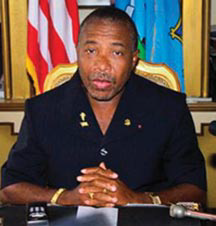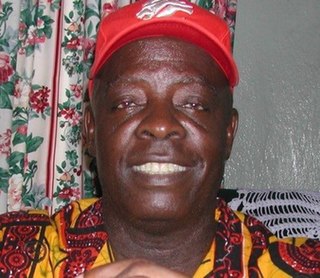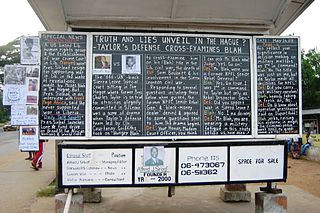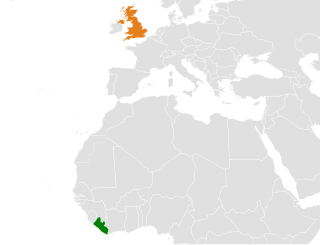
Liberia is a country in West Africa founded by free people of color from the United States. The emigration of African Americans,both freeborn and recently emancipated,was funded and organized by the American Colonization Society (ACS). The mortality rate of these settlers was the highest among settlements reported with modern recordkeeping. Of the 4,571 emigrants who arrived in Liberia between 1820 and 1843,only 1,819 survived (39.8%).

The Politics of Liberia takes place in a framework of a presidential representative democratic republic modeled on the government of the United States,whereby the President is the head of state and head of government;unlike the United States,however,Liberia is a unitary state as opposed to a federation and has a pluriform multi-party system rather than the two-party system that characterizes US politics. Executive power is exercised by the government. Legislative power is vested in both the government and the two chambers of the legislature.

Charles McArthur Ghankay Taylor is a Liberian former politician and convicted war criminal who served as the 22nd president of Liberia from 2 August 1997 until his resignation on 11 August 2003 as a result of the Second Liberian Civil War and growing international pressure.

Samuel Kanyon Doe was a Liberian politician who served as the 21st President of Liberia from 1986 to 1990. He ruled Liberia as Chairman of the People's Redemption Council (PRC) from 1980 to 1986 and then as president from 1986 to 1990.
Prince Yormie Johnson is a Liberian politician and former warlord who has served as a senator for Nimba County since 2006. A former rebel leader,Johnson played a prominent role in the First Liberian Civil War.

Moses Zeh Blah was a Liberian politician. He served as the 28th vice president of Liberia under President Charles Taylor and became the 23rd president of Liberia on 11 August 2003,following Taylor's resignation. He served as president for two months,until 14 October 2003,when a United Nations-backed transitional government,headed by Gyude Bryant,was established and Bryant was sworn in as Chairman of the Transitional Government of Liberia.
Charles Taylor most often refers to:
Monie Ralph Captan is the former foreign minister of Liberia from 1996 until 2003,former of Presidential Affairs 1996. During most of that time he served under President Charles Taylor. Captan's mother was a native of Liberia and his father was Lebanese. Before serving as foreign minister,he was a local businessman,owner of an independent Liberian newspaper and a professor at the University of Liberia. During the Liberian Civil War,his newspaper expressed views which sometimes came across as being sympathetic to Charles Taylor and his National Patriot Front of Liberia (NPFL). When Taylor won the elections,he was subsequently named foreign minister. He is one of several Liberian elites who were not members of Taylor's NPFL to be appointed to high level positions. During the Liberian Civil war he resided in Monrovia which was never controlled by the NPFL. Currently,Executive Chairman Comium Liberia. Captan who was overwhelmingly elected with over 70% of the votes on March 16,2010 as President of the Liberia Chamber of Commerce.

The First Liberian Civil War was the first of two civil wars within the West African nation of Liberia which lasted between 1989 and 1997. President Samuel Doe's regime of totalitarianism and widespread corruption led to calls for withdrawal of the support of the United States,by the late 1980s. The National Patriotic Front of Liberia (NPFL) led by Charles Taylor invaded Liberia from the Ivory Coast to overthrow Doe in December 1989 and gained control over most of the country within a year. Doe was captured and executed by the Independent National Patriotic Front of Liberia (INPFL),a splinter faction of the NPFL led by Prince Johnson,in September 1990. The NPFL and INPFL fought each other for control of the capital city,Monrovia and against the Armed Forces of Liberia and pro-Doe United Liberation Movement of Liberia for Democracy. Peace negotiations and foreign involvement led to a ceasefire in 1995 but fighting continued until a peace agreement between the main factions occurred in August 1996. Taylor was elected President of Liberia following the 1997 Liberian general election and entered office in August of the same year.
Thomas Yaya Nimely is a Liberian politician and former rebel leader who has served as a senator for Grand Gedeh County since 2024.

General elections were held in Liberia on 19 July 1997 as part of the 1996 peace agreement ending the First Liberian Civil War. The presidency,as well as all seats in the House of Representatives and the Senate were up for election. Voter turnout was around 89%. Former rebel leader Charles Taylor and his National Patriotic Party (NPP) won the election with 75.3% of the vote,giving it about three-quarters of the legislative seats according to the proportional representation system. Taylor was inaugurated as president on 2 August 1997.
The National Patriotic Front of Liberia (NPFL) was a Liberian rebel group that initiated and participated in the First Liberian Civil War from 24 December 1989 –2 August 1997. The NPFL emerged out of rising ethnic tensions and civil unrest due to the Liberian government that was characterized by totalitarianism,corruption,and favoritism towards ethnic Krahns. The NPFL invaded Liberia through Ivory Coast’s border with Nimba County in Liberia under the direction of Charles Taylor,a former Liberian politician and guerrilla leader who served as the 22nd president of Liberia from 2 August 1997 until his resignation on 11 August 2003.
Wilton Gbakolo Sengbe Sankawulo,Sr. was a Liberian politician and author who served as the leader of Liberia from 1 September 1995 until 3 September 1996,as chairman of the Council of State.
The Hon. Lewis G. Brown II is former Minister for Information,Cultural Affairs and Tourism in Liberia. After serving as minister of Information Cultural Affairs and Tourism,Lewis Garseedah Brown II was appointed by President Sirleaf as Liberia's permanent Ambassador at The United Nations and Liberia's Ambassador Extraordinary and Plenipotentiary at the Republic of Cuba in 2016. He's also the chairman of all ECOWAS's Ambassadors at UN. Amb. Brown also served as National Security Advisor to Charles Taylor and also Managing Director of LPRC.

Liberia –United States relations are bilateral relations between Liberia and the United States. The two countries shared a close relationship until the 1970s.

United Nations Security Council resolution 1638,adopted unanimously on 11 November 2005,after recalling all previous resolutions on the situation in Liberia,Sierra Leone and West Africa,the Council included the apprehension,detention and transfer to the Special Court for Sierra Leone of former Liberian President Charles Taylor in the mandate of the United Nations Mission in Liberia (UNMIL).
Dorothy Harriet Eugenia Musuleng Cooper was a Liberian educator,politician and the first woman to serve as Foreign Minister in Liberia. She was born at Arthington,Liberia and obtained her B.S. and M.S. from College of West Africa and San Francisco State University respectively. She worked as a school teacher between graduation and high school and matriculation in 1964 in San Francisco in 1964,curriculum development in the Ministry of Education,and principal of Cuttington University College. She was an education minister in Charles Taylor's shadow government from 1990 to 1993 in the National Patriotic Reconstruction Assembly Government

Liberia–Libya relations have historically revolved around the respective policies of Libya and the Republic of Liberia toward external influence in Africa. This history is in large part founded in Liberia's commitments to its original sponsor,the United States,and the pan-African unity ambitions of Libyan despot Muammar Gaddafi. Gaddafi initially welcomed the overthrow of the longstanding Americo-Liberian regime by Samuel Doe but then also supported Charles Taylor in launching a civil war against Doe. Each country maintains an embassy in the other's capital.

The 1987 Burkina Faso coup d'état was a bloody military coup in Burkina Faso,which took place on 15 October 1987. The coup was organized by Captain Blaise Compaoréagainst incumbent far-left President Captain Thomas Sankara,his former friend and associate during the 1983 upheaval.

Liberia–United Kingdom relations refer to the bilateral relations between Liberia and the United Kingdom. The United Kingdom was the first country to recognize Liberian independence. Liberia has a history of border disputes with the British Colony of Sierra Leone,as well as cumbersome British loans which have at times compromised Liberian sovereignty.










